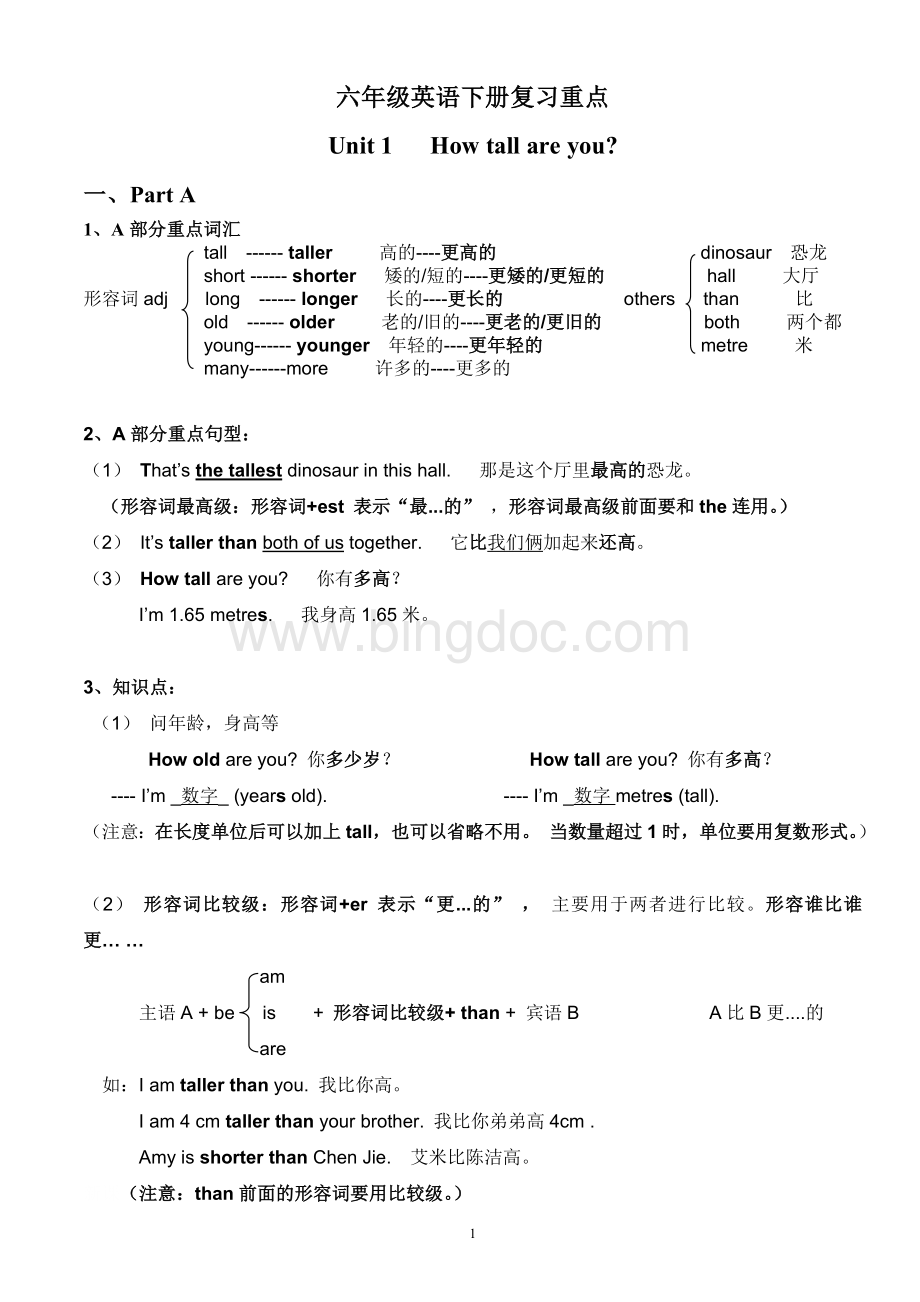pep六年级英语下册复习资料(整理)文档格式.doc
《pep六年级英语下册复习资料(整理)文档格式.doc》由会员分享,可在线阅读,更多相关《pep六年级英语下册复习资料(整理)文档格式.doc(10页珍藏版)》请在冰点文库上搜索。

形容词+er表示“更...的”,主要用于两者进行比较。
形容谁比谁更……
am
主语A+beis+形容词比较级+than+宾语BA比B更....的
are
如:
Iamtallerthanyou.我比你高。
Iam4cmtallerthanyourbrother.我比你弟弟高4cm.
AmyisshorterthanChenJie.艾米比陈洁高。
新课(注意:
than前面的形容词要用比较级。
二、PartB
1、B部分重点词汇:
thin------thinner瘦的----更瘦的kilogram千克
heavy------heavier重的----更重的size号码
big------bigger大的----更大的othersfeet脚(foot的复数)
形容词adj.small------smaller小的----更小的wear穿
strong------stronger强壮的----更强壮的countryside乡村
low------lower低的----更低的shadow影子
smart------smarter聪明的----更聪明的
2、B部分重点句型:
(1)Whatsizeareyourshoes,Mike?
迈克,你穿多大号的鞋?
Myshoesaresize37.我穿37号的鞋。
Size37.37号。
(2)Yourfeetarebiggerthanmine.你的脚比我的大。
(3)Howheavyareyou?
你体重多少?
I’m48kilograms.我体重48千克。
(1)询问体重的句型:
Howheavyareyou?
你有多重?
/你体重多少?
----I’m__数字__kilograms.例:
I’m45kilograms.我体重45千克。
当数量超过1时,kilogram要用复数形式。
(2)询问对方鞋子的尺码:
Whatsizeareyourshoes?
你穿多大号的鞋?
(=Howbigareyourfeet?
你的脚有多大?
)
答语:
Size+数字./Myshoesaresize+数字.我穿____码的鞋。
例:
Myshoesaresize37.我穿37码的鞋。
疑问词how后面的形容词要用原级,如:
howlong多长,howbig多大)
(3)Yourfeetarebiggerthanmine.你的脚比我的大。
mine“我的”是名词性物主代词,后面不需要再接名词,指代句子前面所提事物。
my“我的”是形容词性物主代词,后面需要加名词。
myfather,myfeet
例:
Youreyesarebiggerthanmyeyes.你的眼睛比我的眼睛大。
Youreyesarebiggerthanmine.你的眼睛比我的大。
(myeyes=mine)
(4)形容词比较级的变化规则:
标第一网
一般在词尾加er;
以字母e结尾,加r;
nice---nicer
以辅元辅结尾,应双写末尾的辅音字母,再加er;
big---biggerthin----thinner
④以“辅音字母+y”结尾,先把y变i,再加er。
heavy----heavier
Unit2Lastweekend上周末
一、PartA
1、A部分重点词汇:
clean---cleanedmyroom打扫我的房间
wash---washedmyclothes洗我的衣服
动词的过去式stay---stayedathome待在家里
watch---watchedTV看电视
drink---dranktea喝茶
(1)Howwasyourweekend?
你周末过得怎么样?
(横线上可换其他时间:
summerholiday...)
Itwasgood/fine/OK/great,thankyou.很好,谢谢。
/Notverygood.不太好。
(2)Whatdidyoudo?
你干什么了?
Istayedathomewithyourgrandma.Wedrankteaintheafternoon
andwatchedTV.我和你奶奶待在家里。
我们喝了下午茶,还看了电视。
(3)Didyoudoanythingelse?
你还做了其他什么事吗?
Yes,Icleanedmyroomandwashedmyclothes.
是的,我打扫了房间,还洗了衣服。
(1)询问别人在过去时间里干什么了:
Whatdid+主语+do(过去时间)?
(主语可以是you,he,she,they,yourfather,Mike.......)
过去时间词:
yesterday昨天,lastweek上星期,lastweekend上周末.....时间词可省略
答语:
主语+动词过去式+其他.如:
Whatdidshedo?
---ShewatchedTV.
WhatdidMikedoyesterday?
---Hecleanedhisroom.
did后面的动词要用原形。
问句用过去时提问,答语也要用过去时回答)
(2)动词过去式的变化规则:
1、一般在动词词尾加上ed。
cleaned,washed,played,worked
2、以e结尾的动词在词尾加上d。
如:
liked,used,lived
3、以辅音字母和y结尾的动词改y为i,再加上ed。
studied,cried
4、以辅元辅结尾的,应双写末尾的辅音字母,再加ed。
stopped,planned
5、不规则动词过去式:
am/is-was,are-were,do-did,have-had,go-went......
二、PartB
read---readabook看书lastweekend上个周末
动词过去式see---sawafilm看电影lastMonday上个星期一
have---hadacold感冒 过去时间lastnight昨晚
sleep---slept睡觉yesterday昨天
thedaybeforeyesterday前天
(1)Iwanttobuythenewfilmmagazine.我想要买期新的电影杂志。
(wantto后面接动词原形)
(2)Whatdidyoudolastweekend?
你上周末干什么了?
Istayedathomeallweekendandslept.我整个周末都待在家里睡觉。
(3)Didyouseeafilm?
你看电影了吗?
(didyou后面的动词要用原形)
--Yes,Idid.是的,我看了。
--No,Ididn’t.不,我没看。
/No,Ihadacold.不,我感冒了。
(1)询问别人在过去时间是否做了某事:
Didyou+动词原形(see,sleep,swim)+其他?
Yes,I/wedid.(肯定回答)No,I/wedidn'
t.(否定回答)
Didyouhaveacold?
你感冒了吗?
Yes.Idid.是的,我感冒了。
Didheseeafilm?
他看电影了吗?
Yes,hedid./No,hedidn'
t.
Didshesleepyeaterdayafternoon?
她昨天下午睡觉了吗?
Yes,shedid./No,shedidn'
(2)Be动词的过去式:
①am和is的过去式是was。
(wasnot=wasn’t)
②are的过去式是were。
(werenot=weren’t)新课标第一网
(3)陈述句变成否定句的两种情况:
①句中含有be动词/情态动词can,可直接在be动词/情态动词can后加not。
如:
Itwasnotinteresting.它没有趣。
Hecannotswim.他不会游泳。
②句中没有be动词/情态动词,则在动词前面加don'
t/doesn'
t/didn'
t,原来动词要变回原形
Igotoschoolonfoot.变否定:
Idon'
tgotoschoolonfoot.
如Helikessinging.变否定:
Hedoesn'
tlikesingsing,
Shesawafilmlastnight.变否定:
Shedidn'
tseeafilmlastnight.
(4)陈述句变成一般疑问句的两种情况:
①句中含有be动词/情态动词can,可直接把句中原有的be/情态动词移至句首。
如:
Itwasinteresting.变一般疑问句:
Wasitinteresting?
Shecantakeatrip.变一般疑问句:
Canshetakeatrip?
②句中没有be动词/情态动词,则在句首加do/does/did,句中原来动词要变回原形
Igotoschoolonfoot.变一般疑问句:
Doyougotoschoolonfoot?
如Helikessinging.变一般疑问句:
Doeshelikesingsing?
Shesawafilmlastnight.变一般疑问句:
Didsheseeafilmlastnight?
Unit3Wheredidyougo?
你去哪里了?
gofishing---wentfishing去钓鱼LabourDay劳动节
gocamping---wentcamping去野营mule骡子
rideahorse---rodeahorse骑马其它Turpan吐鲁番
动词过去式rideabike---rodeabike骑自行车till直到
hurtmyfoot---hurtmyfoot弄伤我的脚phote照片
falloff---felloff从…摔倒
can---could能
(1)Whathappened?
怎么了?
(用来询问过去发生了什么事)
(2)Areyouallright?
你还好吗?
(用来询问对方的身体状况)
I’mOK/good/fine/greatnow.我现在没事了。
/我现在很好。
(肯定回答)
Notverywell.不太好。
(否定回答)
(3)Wheredidyougo?
你去哪里了?
(4)Itlookslikeamule!
它看起来像头骡子!
(横线上可换成其他名词,如dog,pen....)
(5)DidyougotoTurpan?
你们去吐鲁番了吗?
Did后面的动词要用原形)
Yes,Idid.是的,我去了。
/No,Ididn’t.不,我没去。
Yes,wedid.是的,我们去了。
/No,wedidn’t.不,我们没去。
(1)询问别人过去去了哪里:
Wheredid+主语+go+(过去时间)?
时间可省略
主语+wentto+地点.(thecinema,aforestpark,Beijing.........)
Wheredidyougoyesterday?
你昨天去哪了?
---Iwenttothecinema.我去电影院了。
Wheredidhegolastweek?
他上周去哪了?
---HewenttoBeijing.他去北京了。
Wheredidshegoyesterday?
她昨天去哪了?
---Shewenttoaforestpark.她去森林公园了。
(2)询问别人是否去了某地:
Did+主语+goto+地点?
答语:
Yes,主语+did./No,主语+didn'
t.
DidhegotoShanghai?
他去上海了吗?
---Yes,hedid./No,hedidn'
DidSarahgotothelibrary?
萨拉去图书馆了吗?
---Yes,shedid./No,shedidn'
t.
goswimming---wentswimming 去游泳
动词过去式eatfreshfood---atefreshfood吃新鲜的食物
takepictures---tookpictures照相
buygifts---boughtgifts买礼物
(1)Howdidyougothere?
你们怎么去那的?
(注意:
did后面的动词要用原形)
Wewenttherebyplane.我们坐飞机去那的。
(2)Soundsgreat!
听上去不错!
(横线上可换成其他形容词,如:
good,bad,interesting....)
(1)询问别人过去怎么去某地:
Howdid+主语+goto地点?
...怎么去...的?
主语+wentthere+交通方式.(如:
onfoot,bybus,byplane......)
Howdidyougothere?
你怎么去哪的?
---Iwentthereonfoot.我走路去那的。
Howdidhegotothelibrary?
他怎么去图书馆的?
---Hewenttherebybus.他坐公共汽车去那的。
HowdidAmygotoBeijing?
艾米怎么去北京的?
---Shewenttherebyplane.她坐飞机去那的。
如果goto后的地点词是there那里时,要省略to,直接说gothere。
)
(2)overthewinterholidayover在....期间
(3)常见的不规则动词过去式:
am/is--was,are--were,do--did,have--had,go--went,drink--drank,eat--ate,
take--took,ride--rode,hurt--hurt,read--read,see--saw,sleep--slept,get--got,
can--could,make--made,buy--bought
Unit4Thenandnow当时和现在
dininghall饭厅ago以前
必背词gym体育馆…yearsago…年前
grass草坪表示过去时间…monthsago…月前
lastmonth上个月
lastyear去年
atthattime在那时1.c|O|m
(1)Therewasnolibraryinmyoldschool.我以前的学校里没有图书馆。
(2)Tellusaboutyourschool,please.请给我们讲讲您的学校吧。
(横线处可换成其他词,如:
yourfamily,yourteacher.......)
(3)Howdoyouknowthat?
你怎么知道的?
(用来询问别人如何知道某事的)
(4)TherewerenocomputersorInternetinmytime.
我那时候